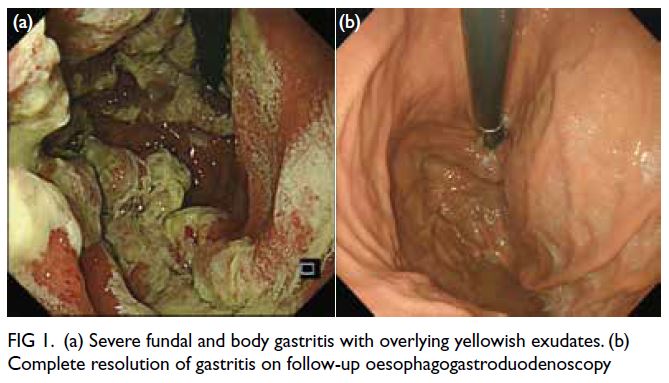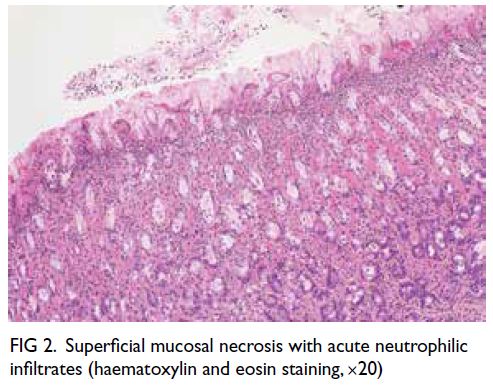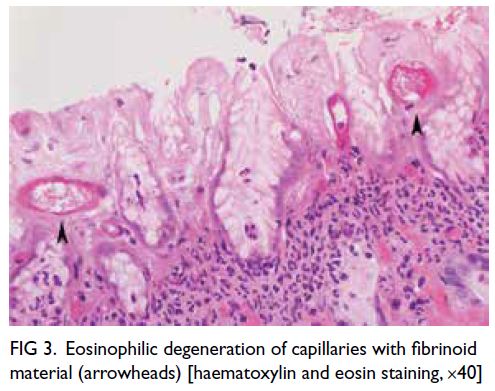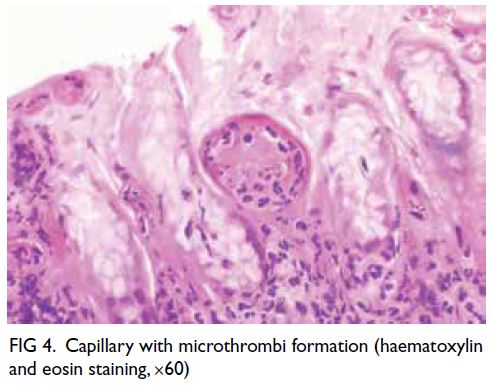Hong Kong Med J 2024;30:Epub 15 Apr 2024
© Hong Kong Academy of Medicine. CC BY-NC-ND 4.0
PICTORIAL MEDICINE
Doxycycline-induced gastric injury
Henry HW Liu, FHKCP, FHKAM (Medicine)1; TW Ho, MB, BS2; Nelson SK Tsang, MB, BS1; Jodis TW Lam, FRCP (Edin), FHKAM (Medicine)1; YT Hui, FRCP (Edin), FHKAM (Medicine)1
1 Department of Medicine, Queen Elizabeth Hospital, Hong Kong SAR, China
2 Department of Pathology, Queen Elizabeth Hospital, Hong Kong SAR, China
Corresponding author: Dr Henry HW Liu (lhw738@ha.org.hk)
A 28-year-old man with good past health presented
with fever, dyspnoea, and pleuritic chest pain
in April 2022. Blood tests showed hypochromic
microcytic anaemia with haemoglobin level of 7 g/dL
but no bleeding symptoms. Chest X-ray revealed
left-sided pleural effusion. The working diagnosis
was chest infection with parapneumonic effusion.
He was treated with empirical co-amoxiclav and
doxycycline.
Thoracocentesis yielded blood-stained
fluid with an exudative biochemistry. Pleural
fluid adenosine deaminase level was 58 U/L and
cytology was negative. Findings were suspicious
of tuberculous pleural effusion. Gastroscopy was
arranged for his anaemia and revealed severe gastritis
over the body and fundus with overlying yellowish
exudates (Fig 1a). Biopsies excluded Helicobacter pylori infection but revealed superficial mucosal
necrosis with acute neutrophilic infiltrates (Fig 2).
The superficial capillaries displayed eosinophilic
degeneration (Fig 3) with microthrombi formation
(Fig 4). These histological findings are characteristic
of doxycycline-induced gastric mucosal injury.1 2 3

Figure 1. (a) Severe fundal and body gastritis with overlying yellowish exudates. (b) Complete resolution of gastritis on follow-up oesophagogastroduodenoscopy

Figure 2. Superficial mucosal necrosis with acute neutrophilic infiltrates (haematoxylin and eosin staining, ×20)

Figure 3. Eosinophilic degeneration of capillaries with fibrinoid material (arrowheads) [haematoxylin and eosin staining, ×40]
Doxycycline was withdrawn and the patient
was started on antituberculosis treatment. Pleural
fluid culture later confirmed infection with
Mycobacterium tuberculosis. Follow-up upper
endoscopy at 3 months showed complete resolution
of gastric mucosal injury (Fig 1b). Haemoglobin
analysis revealed findings compatible with
Haemoglobin H disease.
Doxycycline is a tetracycline-class antibiotic
commonly prescribed to cover atypical organisms
in community-acquired pneumonia. It is a well-reported cause of oesophagitis and even
ulcerations.4 On the contrary, doxycycline-induced
gastric mucosal injury is rare and has a distinctive
histological pattern. The underlying mechanism of
injury is poorly understood. Duration of doxycycline
treatment ranges from 5 days to 3 years.1 2 3 These
patients often present with dysphagia, chest and
epigastric pain or anaemia. Symptoms typically
resolve following drug withdrawal and healing of the
mucosa.1 2 3
Awareness of an association with doxycycline
use, coupled with endoscopic and unique
histological findings, facilitate prompt diagnosis of
this condition.
Author contributions
All authors contributed to the concept or design of the study,
acquisition of the data, analysis or interpretation of the
data, drafting of the manuscript, and critical revision of the
manuscript for important intellectual content. All authors
had full access to the data, contributed to the study, approved
the final version for publication, and take responsibility for its
accuracy and integrity.
Conflicts of interest
All authors have disclosed no conflicts of interest.
Funding/support
This study received no specific grant from any funding agency in the public, commercial, or not-for-profit sectors.
Ethics approval
The patient was treated in accordance with the Declaration of Helsinki and provided informed consent for all procedures.
References
1. Affolter K, Samowitz W, Boynton K, Kelly ED. Doxycycline-induced gastrointestinal injury. Hum Pathol 2017;66:212-5. Crossref
2. Shih AR, Lauwers GY, Mattia A, Schaefer EA, Misdraji J.
Vascular injury characterizes doxycycline-induced upper
gastrointestinal tract mucosal injury. Am J Surg Pathol
2017;41:374-81. Crossref
3. Xiao SY, Zhao L, Hart J, Semrad CE. Gastric mucosal
necrosis with vascular degeneration induced by
doxycycline. Am J Surg Pathol 2013;37:259-63. Crossref
4. Gencosmanoglu R, Kurtkaya-Yapicier O, Tiftikci A, Avsar
E, Tozun N, Oran ES. Mid-esophageal ulceration and
candidiasis-associated distal esophagitis as two distinct
clinical patterns of tetracycline or doxycycline-induced
esophageal injury. J Clin Gastroenterol 2004;38:484-9. Crossref


